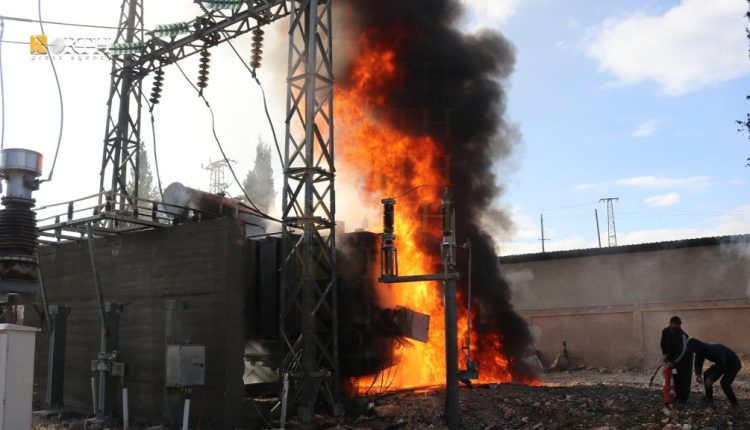An official in the Water Directorate in the city of Kobani, northern Syria, affiliated with the Autonomous Administration of North and East Syria (AANES), stated that recent Turkish airstrikes on two electrical substations in Kobani and the town of Ain Issa resulted in depriving over 600 villages of drinking water and reducing the amount of water pumped to the city.
On Jan. 14, Turkey targeted the two stations in Kobani and Ain Issa by drones, knocking them out of service.
Masoud Bozi, Co-chair of the Water Directorate in Kobani, stated that the recent Turkish attacks on infrastructure facilities in northern and northeastern Syria are considered war crimes because they deprive the region’s residents of electricity and water.
“Turkey’s objective not only aims to strike the AANES project but also to displace residents of the region,” Bozi told North Press.
Regarding the direct impact of the airstrikes on the Directorate’s work, the official stated that the destruction of the electrical substations in Ain Issa and Kobani disrupted the operation of water stations which heavily rely on electric power for water pumping, around 90 percent dependency.
Bozi noted that the electricity-dependent pumping stations are currently inoperative, and even the backup power generators in some of these stations cannot function at full capacity. This limitation arises from the Turkish targeting of oil facilities, which has disrupted the fuel supply necessary for operating the diesel-powered generators.
Additional costs arise from running these stations by using generators, such as maintenance expenses. Moreover, some water stations do not have backup generators, according to Bozi.
The official stated that residents in most villages with no drinking water network have private wells that operate on electricity. Deprived of electricity, people in these villages have no access to potable water.
“Around 120,000 families in the region currently suffer from power outage and water shortage,” Bozi said.
He added that water stations in villages in the eastern, southern, and western countryside of Kobani, in addition to the town of Ain Issa and its surrounding areas, are out of service due to the lack of generators.
Bozi pointed out that water stations with operating generators run for only a few hours. When electricity was available, those stations used to operate from 16 to 18 hours daily. Power assisted in running water stations for six to eight hours, and generators were operated for 12 hours, resulting in a total of 18 hours of pumping water.
Currently, the operating hours of these stations range between six and eight hours, which are insufficient for the residents. Consequently, this affects drinking water supply in Kobani city and nearby villages.
Water is pumped directly from the Euphrates River through water stations in the villages of Zor Maghar and al-Shuyukh, which are hit on almost a daily basis, prompting employees to shut down these stations to avoid being targeted.
Bozi mentioned that the amount of water reaching Kobani has decreased, and the hours of water supply to the city have been reduced from 10 to six. He noted that these hours might be further reduced depending on the circumstances as drones continue to hover over water pumping stations.
Bozi stated that there are approximately 660 villages and farms in the countryside of Kobani and Ain Issa. About 90 percent of these villages lack an access to the water network and are deprived of water due to the blackout.
“The hours of water pumping have been reduced by 40 to 60 percent in the villages connected to the water network,” Bozi added.

